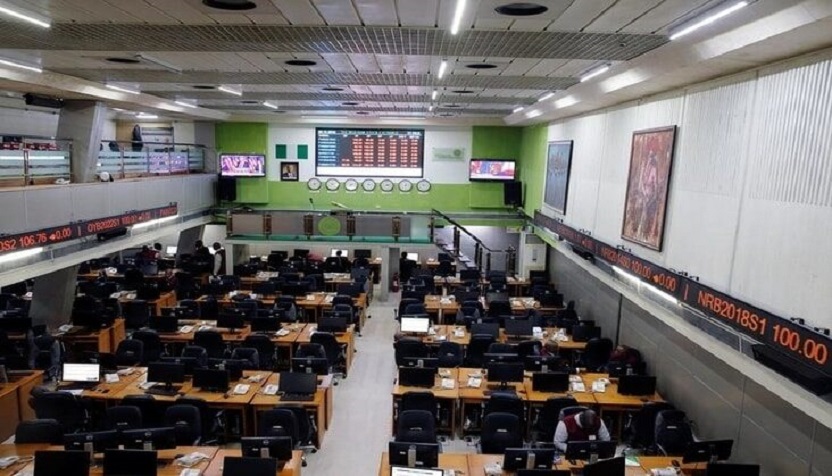Economy
Nigeria’s Asset Under Management Grows 25% to N3.5trn—Agusto

By Adedapo Adesanya
Research and ratings agency, Agusto & Co., has estimated that Nigeria’s assets under management (AuM), as of the end of 2022, grew by 25 per cent to N3.5 trillion ($7.8 billion).
This makes Nigeria the third largest investment management zone in sub-Saharan Africa, after South Africa and Morocco.
In a note shared with Business Post, it was stated that this growth was driven in part by increased investor confidence following the gradual rise in the yields offered on naira-denominated investments during the latter half of the year and growth in dollar-denominated portfolios as discerning Nigerians hedge against the persistent devaluation of the naira.
Nonetheless, despite Nigeria’s population estimate of 220 million people and the high foreign exchange remittance inflows from Nigerians living in the diaspora ($20.9 billion or N9.3 trillion in 2022), the asset management industry continues to underachieve.
The firm noted that the industry’s growth remains constrained by a large informal sector (estimated at 65 per cent of GDP), a high poverty rate of 40 per cent and limited investment opportunities offered by the Nigerian capital market.
It warned that the challenging operating environment in Nigeria has led to an erosion of real incomes and purchasing power, prompting a surge in investors’ inclination towards dollar-denominated assets.
“The escalation of the year-over-year inflation rate from 15.6 per cent in January 2022 to 21.37 per cent in December 2022 is indicative of an unfavourable macroeconomic climate. In addition, the parallel market exchange rate stood at N750/$ as of December 31, 2022, indicating a 63 per cent arbitrage from the official market rate and a 32 per cent depreciation from N570/$ recorded in the corresponding period of the prior year.”
According to Agusto, Naira-denominated investments have lost their lustre in light of current market conditions, and investors are instead looking to high-yield alternatives and FCY-denominated investments.
“In 2022, segregated portfolios accounted for more than half of total managed assets (52 per cent), which amounted to N1.76 trillion as of December 31, 2022, – 40.2 per cent higher than in 2021 – marking a noteworthy shift in the Industry as segregated portfolios overtook collective investment schemes (CISs) in terms of AuM share for the first time in three years.”
Segregated portfolios include privately managed discretionary and non-discretionary client funds, as well as other private collective investment schemes, which provide investment options that are tailored to the unique risk profiles and investment objectives of individual clients. Unlike collective investment schemes, segregated portfolios provide more flexibility and autonomy as they are not directly subject to the scrutiny and monitoring of the Securities and Exchange Commission (SEC).
Agusto estimated that CISs accounted for 42 per cent (N1.37 trillion) of AuM in 2022, while alternative assets – comprising publicly-listed private equity and infrastructure funds – accounted for the remaining 6 per cent (N345 billion) of the asset management industry’s managed assets as at the same date.
“Investors have shown a growing inclination towards privately managed portfolios rather than the often more restrictive and conservative collective investment schemes, as they seek to gain relatively higher yields from investments.
“In addition, many asset managers have focused more on fostering the growth of segregated portfolios through their investment advisory services while also improving product distribution and enhancing customer experience.
“Furthermore, segregated portfolios have continued to account for a large portion of the Industry’s AuM due to the large volume of funds invested by high-net-worth individuals (HNIs) and corporations seeking exposure to specific investment vehicles (in many cases regional Eurobond issuances).”
These specific investment options typically offer relatively higher returns and provide a currency hedge, which may not be widely accessible with collective investment schemes,” it noted.
Giving an outlook, Agusto & Co. anticipates a moderate increase in the size of the asset management industry, with an estimated average growth rate of 15.9 per cent over the next three years.
This will result in total AuM reaching the N4 trillion mark by 2024, it said.
“Growth is expected to be driven by various factors, including increased investments from pension fund administrators and institutional clients.
“The unification of exchange rates is anticipated to result in the repatriation of funds formerly invested in international money markets and reignite foreign interest in naira-denominated assets.
“Furthermore, the anticipated growth trajectory is likely to be fuelled by an increase in the size of segregated portfolios, infrastructure funds and REITs, amongst others.
“The prolonged deterioration of macroeconomic fundamentals, which might severely reduce discretionary income and the marginal inclination to save, remains a risk to the growth forecast.”
Economy
Food Concepts Return NASD OTC Exchange to Danger Zone

By Adedapo Adesanya
Food Concepts Plc neutralized the gains recorded by three securities, returning the NASD Over-the-Counter (OTC) Securities Exchange into the negative territory with a 0.27 per cent loss on Thursday, December 4.
Yesterday, the share price of the parent company of Chicken Republic and PieXpress declined by 34 Kobo to sell at N3.15 per unit compared with the previous day’s N3.49 per unit.
This shrank the market capitalisation of the OTC bourse by N5.72 billion to N2.136 billion from N2.142 trillion and weakened the NASD Unlisted Security Index (NSI) by 9.57 points to 3,571.53 points from 3,581.10 points.
Business Post reports that Central Securities Clearing System (CSCS) Plc went down by 50 Kobo to N38.50 per share from N38.00 per share, FrieslandCampina Wamco Nigeria Plc gained 29 Kobo to sell at N55.79 per unit versus N55.50 per unit, and Geo-Fluids Plc added 5 Kobo to close at N4.60 per share compared with Wednesday’s closing price of N4.55 per share.
Trading data indicated that the volume of securities recorded at the session surged by 6,885.3 per cent to 4.3 million units from the 61,570 units posted a day earlier, the value of securities increased by 10,301.7 per cent to N947.2 million from N3.3 million, and the number of deals went up by 146.7 per cent to 37 deals from the 15 deals achieved in the previous trading session.
At the close of business, Infrastructure Credit Guarantee Company (InfraCredit) Plc was the most traded stock by value on a year-to-date basis with the sale of 5.8 billion units for N16.4 billion, trailed by Okitipupa Plc with 170.4 million units worth N8.0 billion, and Air Liquide Plc with 507.5 million units valued at N4.2 billion.
InfraCredit Plc also finished the session as the most traded stock by volume on a year-to-date basis with 5.8 billion units transacted for N16.4 billion, followed by Industrial and General Insurance (IGI) Plc with 1.2 billion units sold for N420.2 million, and Impresit Bakolori Plc with 536.9 million units traded for N524.9 million.
Economy
Investors Gain N97bn from Local Equity Market

By Dipo Olowookere
The upward trend witnessed at the Nigerian Exchange (NGX) Limited in recent sessions continued on Thursday as it further improved by 0.10 per cent.
This was despite investor sentiment turning bearish after the local equity market ended with 23 price gainers and 28 price gainers, indicating a negative market breadth index.
UAC Nigeria gained 10.00 per cent to finish at N88.00, Morison Industries appreciated by 9.94 per cent to N3.54, Ecobank rose by 8.53 per cent to N36.90, and Coronation Insurance grew by 8.47 per cent to N2.56.
On the flip side, Ellah Lakes depreciated by 10.00 per cent to N13.14, Eunisell Nigeria also shed 10.00 per cent to finish at N72.90, Transcorp Hotels slipped by 9.95 per cent to N157.50, Omatek shrank by 9.23 per cent to N1.18, and Guinea Insurance dipped by 8.46 per cent to N1.19.
Yesterday, the All-Share Index (ASI) went up by 152.28 points to 145,476.15 points from 145,323.87 points and the market capitalisation chalked up N97 billion to finish at N92.726 trillion compared with the previous day’s N92.629 trillion.
Customs Street was bubbling with activities on Thursday, though the trading volume and value slightly went down, according to data.
A total of 1.9 billion stocks worth N19.2 billion exchanged hands in 23,369 deals during the session versus the N2.3 billion valued at N21.0 billion traded in 21,513 deals a day earlier.
This showed that the number of deals increased by 8.63 per cent, the volume of transactions depleted by 17.39 per cent, and the value of trades decreased by 8.57 per cent.
For another trading day, eTranzact led the activity chart with 1.6 billion units sold for N6.4 billion, Fidelity Bank traded 31.0 million units worth N589.3 million, GTCO exchanged 28.3 million units valued at N2.5 billion, Zenith Bank transacted 27.1 million units for N1.6 billion, and Ecobank traded 21.9 million units worth N744.3 million.
Economy
Naira Loses 18 Kobo Against Dollar at Official Market, N5 at Black Market

By Adedapo Adesanya
The Naira marginally depreciated against the United States Dollar in the Nigerian Autonomous Foreign Exchange Market (NAFEM) on Thursday, December 4 amid renewed forex pressure associated with December.
At the official market yesterday, the Nigerian currency lost 0.01 per cent or 18 Kobo against the Dollar to close at N1,447.83/$1 compared with the previous day’s N1,447.65/$1.
It was not a different scenario with the local currency in the same market segment against the Pound Sterling as it further shed N15.43 to sell for N1,930.97/£1 versus Wednesday’s closing price of N1,925.08/£1 and declined against the Euro by 20 Kobo to finish at N1,688.74/€1 compared with the preceding session’s N1,688.54/€1.
Similarly, the Nigerian Naira lost N5 against the greenback in the black market to quote at N1,465/$1 compared with the previous day’s value of N1,460/$1 but closed flat against the Dollar at the GTBank FX counter at N1,453/$1.
Fluctuations in trading range is expected to continue during the festive season as traders expect the Nigerian currency to be stable, supported by intervention s by to the Central Bank of Nigeria (CBN)in the face of steady dollar demand.
Support is also expected in coming weeks as seasonal activities, particularly the stylised “Detty December” festivities, will see inflows that will give the Naira a boost after it depreciated mildly last month, according to a new report.
“As the festive Detty December season intensifies, inbound travel, tourism spending, and diaspora inflows are expected to provide moderate support for FX liquidity,” analysts at the research unit of FMDA said in its latest monthly report for November.
Traders cited by Reuters expect that the Naira will trade within a band of N1,443-N1,450 next week, buoyed by improved FX interventions by the apex bank.
Meanwhile, the crypto market was down as the US Federal Reserve’s preferred inflation gauge, core PCE, likely rose in September—moving in the wrong direction. However, volatility indices show no signs of major turbulence.
If the actual figure matches estimates, it would mark 55 straight months of inflation above the US central bank’s 2 per cent target. The sticky inflation would strengthen the hawkish policymakers, who are in favour of slower rate cuts.
Ripple (XRP) depreciated by 4.5 per cent to $2.08, Solana (SOL) went down by 3.8 per cent to $138.11, Litecoin (LTC) shrank by 3.1 per cent to $83.23, Dogecoin (DOGE) slid by 2.5 per cent to $0.1463, Cardano (ADA) declined by 2.1 per cent to $0.4368, Bitcoin (BTC) fell by 0.9 per cent to $91,975.45, Binance Coin (BNB) crumbled by 0.9 per cent to $899.41, and Ethereum (ETH) dropped by 0.7 per cent to $3,156.44, while the US Dollar Tether (USDT) and the US Dollar Coin (USDC) closed flat at $1.00 apiece.
-

 Feature/OPED6 years ago
Feature/OPED6 years agoDavos was Different this year
-
Travel/Tourism9 years ago
Lagos Seals Western Lodge Hotel In Ikorodu
-

 Showbiz3 years ago
Showbiz3 years agoEstranged Lover Releases Videos of Empress Njamah Bathing
-

 Banking7 years ago
Banking7 years agoSort Codes of GTBank Branches in Nigeria
-

 Economy2 years ago
Economy2 years agoSubsidy Removal: CNG at N130 Per Litre Cheaper Than Petrol—IPMAN
-

 Banking3 years ago
Banking3 years agoFirst Bank Announces Planned Downtime
-

 Banking3 years ago
Banking3 years agoSort Codes of UBA Branches in Nigeria
-

 Sports3 years ago
Sports3 years agoHighest Paid Nigerian Footballer – How Much Do Nigerian Footballers Earn
















